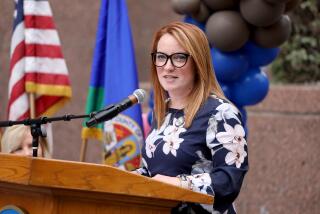Chairman Urges Planning Commission to Cut Talk to Speed Up Process
- Share via
THOUSAND OAKS — It’s nearing midnight on a typical Monday and the Thousand Oaks planning commissioners are leaning far, far back in their council-chamber chairs. Before them, city planning staff discusses the fine technical details of different development proposals while developers anxiously await verdicts on their projects.
Not every Planning Commission meeting stretches into Tuesday’s wee hours. Enough have, however, that commissioners intend to gather today to consider changing their ways.
At a workshop scheduled to begin at 9 a.m., the five-member panel is set to discuss a memo from Chairman Forrest Frields that lists ways to speed up public hearings and review more projects at each meeting. Frields urges commissioners to ask as many of their questions of staff members before meetings and to limit their often far-ranging discussions to questions directly related to a project’s approval or disapproval.
He also wants commissioners’ criticisms--of city codes, the City Council and of each other--dropped.
The changes, he said, are necessary to handle a mounting number of planning cases. “If it doesn’t lead to decision making, let’s forgo it, at least until we have some breathing space,” he said.
The city’s planning department currently has about 25 pending cases, a number Deputy Planning Director Michael J. Sangster described as slightly higher than normal. However, several large and complex projects, including the 2,350-home Dos Vientos development in Newbury Park, will soon reach the Planning Commission and may take up a disproportionate amount of the panel’s time, he said.
In response, the commission has already increased its meetings per month, from two to three, and Frields wants to add a fourth.
Frields said his suggestions for speeding the pace of meetings should allow the commission to review four cases in a night. He hopes they will also encourage more citizen input at meetings. Few people, he said, can accommodate sitting in the council chambers late into the night, waiting to comment on a case that hasn’t yet been called.
“It’s a dedicated opponent or proponent who stays past 10,” he said.
Several commissioners said they welcomed the effort to make their meetings more efficient. Commissioner John Powers said public hearings can easily bog down under the weight of technical questions.
“It’s necessary for commissioners to ferret out as much information from staff prior to the meeting [as possible],” he said. “Some of the information could easily be found from a call.”
But Commissioner Marilyn Carpenter said such technical questions--when asked during the televised, public hearings--help citizens understand development projects. Without them, citizens might miss important details and, as a result, might not understand commission decisions.
“Those kinds of questions help to keep the public informed,” she said. “I believe we make better decisions when all the questions are fully aired. It would be wonderful if we could get out early, but I’m not interested in rubber-stamping anything just to get out early.”
Commissioners agreed, however, on the need to keep their meetings civil. Deep divisions exist within the panel--regarding the pace of overall development in Thousand Oaks, the importance of property rights, even the commission’s role in shaping projects--and those divisions have occasionally flared during meetings.
Frields admits that some of the barbs being traded have been his. In one recent meeting, he accused Commissioner Linda Parks of “grandstanding” after she voted against a project to which she had just helped add development conditions.
“It was a true assessment, but it was unnecessary, and I regret it,” he said Wednesday. “It did not add to a working relationship, didn’t advance the decision-making process, and it won’t happen again.”
Despite their interest in speeding up meetings, several commissioners said it won’t be an easy task. By its nature, the commission deals in minute, technical details, and they said some long discussions may be inevitable.
“How do you become more efficient?” Commissioner Ronald Polanski asked. “You need to be able to stray a little bit and yet not end up philosophizing about why the sky is blue.”
More to Read
Get the L.A. Times Politics newsletter
Deeply reported insights into legislation, politics and policy from Sacramento, Washington and beyond. In your inbox twice per week.
You may occasionally receive promotional content from the Los Angeles Times.










